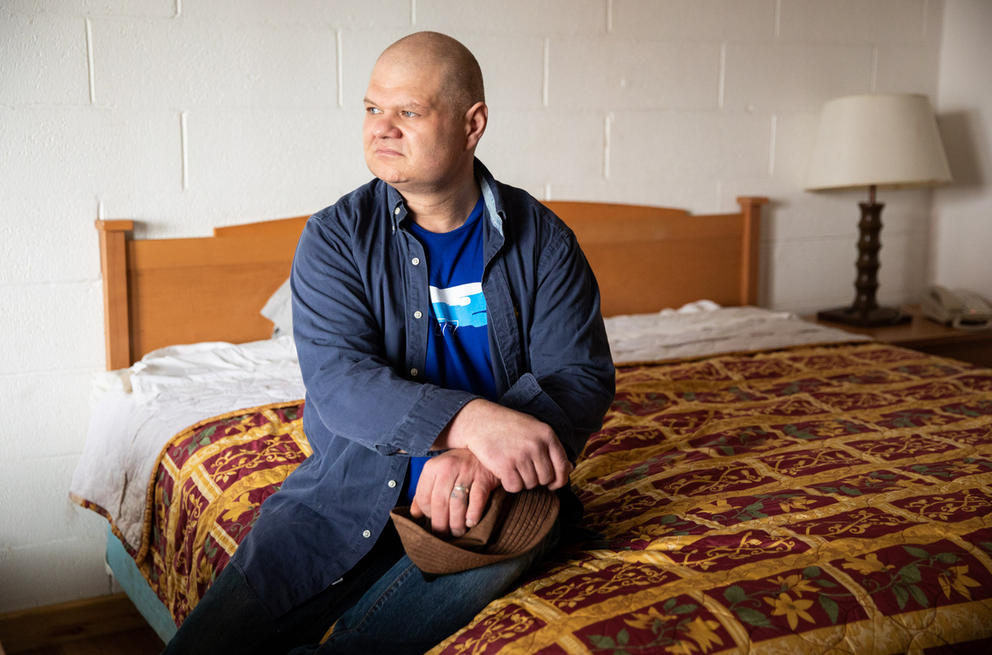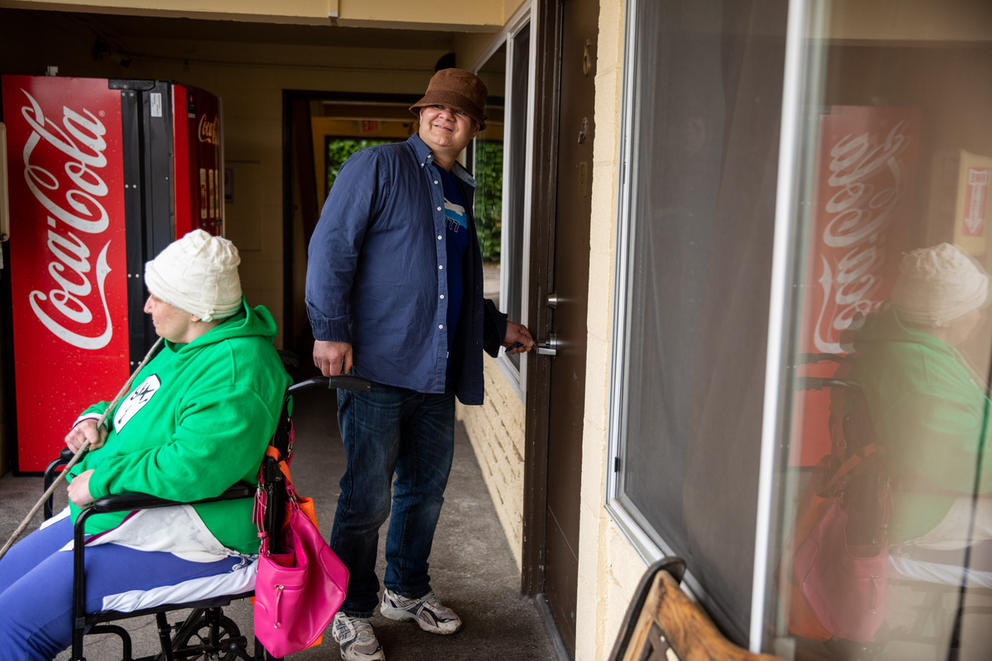Based on that probable cause statement — which the deputy later said was inaccurate — Young was charged with theft.
What Young and his attorney didn’t know at the time was that the deputy who testified about the alleged bicycle theft, Doug Maya, had “a long-documented history of report writing issues” and a “long history of unsatisfactory work performance,” according to his supervisors.
But that information arguably shouldn’t have been a secret. Like all prosecutors, the one who charged Young with theft was legally and ethically obligated to share evidence that could cast doubt on the deputy’s testimony, as well as other information that could hurt the state’s case and help exonerate Young.
That didn’t happen, Young’s lawyer said, causing Young months of stress and disruption before a jury eventually found him not guilty.
This was not an isolated incident, according to criminal defense attorneys across Washington state.
Defense lawyers say prosecutors regularly compromise defendants’ due process rights by not sharing evidence that could undermine the prosecution’s case, or potentially prove a person’s innocence.
“A lot of defense attorneys, we have to do the prosecutor’s job for them, and find these things out on our own,” said Kimberly La Fronz, a public defender in King County.
Young said that during the two years the theft case dragged on, his business working as a mechanic on San Juan Island dried up, causing him to lose income. He eventually became homeless.
“It is a small community. You get something like that thrown at you, nobody is going to hire you,” Young said last month. “It really crippled me financially.”
Although standards of professional ethics require prosecutors to turn over just about anything that could hurt their case, prosecutors rarely face consequences when they fail to do so, said Kimberly Ambrose, a professor who teaches a course on professional responsibility at the University of Washington School of Law. She said questionable actions by prosecutors hardly ever get reported.
“The ethical obligations are rarely enforced,” Ambrose said. “... I think it just speaks to a profession that isn't very good at holding itself accountable.”
Justice versus convictions
Last year, Crosscut examined law enforcement officers who land on prosecutors’ lists of police witnesses with credibility issues. Prosecutors keep these lists — commonly known as Brady lists — so they can inform defense attorneys about police officers’ past dishonesty, lapses in judgment, racial bias or other issues that could cast doubt on a cop’s testimony.
Such disclosures are required under past court rulings, including the 1963 case of Brady v. Maryland, as well as ethics rules that apply specifically to prosecutors.
“At the end of the day, the prosecutor's job is to do justice — it's not to get a conviction,” said state Sen. Manka Dhingra, D-Redmond, who chairs the Senate Law & Justice Committee and has worked as a King County deputy prosecutor.
Yet there’s no Brady-type list of prosecutors who fail to turn over information that could damage their case.
Defense attorneys say prosecutors fail to share information that is favorable to defendants more often than people realize.
“I would say it has happened enough in my career where I now look for it,” said Ali Hohman, the director of legal services at the Washington Defender Association, which represents public defense attorneys.
At the same time, prosecutors rarely face discipline over such issues. In three recent cases in Snohomish County, judges ruled that deputy prosecutors engaged in misconduct, but none ended up being disciplined by the state bar association.
In other cases Crosscut reviewed, officers were added to county Brady lists only after defense attorneys raised concerns about incidents in a cop’s background. That can be an issue because prosecutors have a duty not only to share information that favors defendants, but to actively seek it out; they also are expected to know everything police know.
Other times, such as with Maya, an officer’s history of performance issues or writing faulty reports wasn’t enough to prompt a prosecutor to add that officer to the county’s Brady list, leaving defense attorneys in the dark about the officer’s past issues.
Robert Bulloch, the lawyer who represented Young in the bicycle theft case, said that even after Maya resigned under pressure shortly before Young's trial, the San Juan County prosecutor didn't tell him about Maya's problems at work. Bulloch said the prosecutor also didn’t share that Maya had once been placed on administrative leave because of citizen complaints, as well as over his history of emotional outbursts and “incomplete investigation.”
After Young’s case ended, Bulloch asked the prosecutor to consider adding Maya to the county’s Brady list, so defense attorneys going forward would know about Maya’s inaccurate statement and his troubled history.
The prosecutor declined, saying such a step wasn’t necessary— mainly because Maya wasn’t found to have intentionally lied.
Different standards
Prosecutors vary widely in terms of what information they think they are required to share.
Randall Gaylord, the San Juan County prosecutor whose office handled Young’s theft case, said his office informs defense attorneys about officer misconduct if an officer has sustained disciplinary findings of dishonesty or untruthfulness — or, if a judge rules an officer was dishonest.
Because Maya wasn’t sanctioned specifically for lying or making a false statement, Gaylord said the deputy’s history of shoddy report writing, outbursts and poor work performance didn’t need to be disclosed.
“To be subject to disclosure, there should be a finding of dishonesty or falsehood,” Gaylord wrote in an email.
King County, where Seattle is located, has a slightly broader definition of what should land an officer on the Brady list. But a good deal of officer misconduct still doesn’t make the cut.
The King County Prosecuting Attorney’s Office generally puts cops on its Brady list when they have disciplinary findings of dishonesty, biased policing, criminal conduct or pending allegations of the same, said spokesperson Casey McNerthney.
“We are well aware of our obligations, and err on the side of disclosure,” wrote Dan Clark, the head of the criminal division of the King County Prosecuting Attorney’s Office, in an email to Crosscut.
Yet the Washington Association of Prosecuting Attorneys recommends that prosecutors disclose even more.
Prosecutors are obligated to turn over a wide range of information that could cause a jury to second-guess the state’s case; that can include allegations that didn’t lead to findings of misconduct, or behavior for which an officer was never formally disciplined, said Pam Loginsky, the prosecutor association’s staff attorney.
An officer making inaccurate statements under oath or in official reports also should be disclosed, Loginsky said, even if those falsehoods weren’t necessarily intentional.
The same goes for forensic lab failures, conflicting statements from witnesses or issues involving the mishandling of evidence, she added.
Gaylord said another reason he chose not to add Maya to San Juan County’s Brady list is because Maya resigned.
A new state law hinges on prosecutors keeping their Brady lists updated to ensure police agencies can find out whether officers were flagged as having credibility issues in past jobs.
Under the new law, police agencies must ask whether potential new hires are on the Brady list where they previously worked.
Dhingra, the state senator, said that if prosecutors don’t add officers to county Brady lists simply because those officers resigned, it could create a loophole in the new law.
Former officers can also be called on to testify in pending cases, making their disciplinary histories relevant even after they’ve left the force.
Maya, for example, didn’t testify in Young’s trial until 10 months after he resigned.
Maya didn’t respond to messages asking him to comment for this story.
Jason Young and his partner, Rashelle Bradley, enjoy time by the water near their hotel in Anacortes on Friday, March 25, 2022. During Young's theft trial, a deputy who originally said a security video showed Young stealing bicycles recanted that statement. Although the deputy had a prior history of "report-writing issues" and other performance problems, that information wasn't shared with Young's attorney. (Amanda Snyder/Crosscut)
Flagged in some counties, but not all
Washington State Trooper Jacob Ballard is on the Brady list in some Washington counties — just not in King County, where he currently works.
In 2016, the State Patrol told prosecutors about disciplinary findings that could hurt Ballard’s credibility as a witness.
In addition to various performance problems, Ballard had been spending time outside his assigned patrol area during hours he claimed to have worked, according to his supervisors. Records show his superiors were concerned he might have been falsifying his timecard.
Because of those concerns, the State Patrol discussed with the Thurston County prosecutor whether to charge Ballard with theft.
No charges were ultimately filed, but a settlement agreement found Ballard had violated six different agency policies.
Still, King County doesn’t think that information is relevant to disclose to defense attorneys.
La Fronz, the King County public defender, worked on two driving under the influence cases in 2019 where Ballard was the arresting officer and main witness. She said the State Patrol’s suspicions that Ballard committed timecard fraud speak to his credibility as well as his potential to mislead a jury, and should have been disclosed.
Records show Ballard’s supervisors also wanted him to increase the number of people he stopped for driving under the influence. La Fronz said that, too, is relevant because it could make jurors question whether Ballard was pulling over drivers arbitrarily to meet a quota.
A district court judge in one DUI case initially agreed the information about Ballard should have been turned over, suppressing Ballard’s testimony because of the prosecutor’s failure to disclose his disciplinary file.
But that ruling was later reversed, with the judge saying the defense couldn’t prove Ballard’s disciplinary history had a reasonable probability of changing the outcome of the case.
Ballard didn’t respond to messages asking him to comment for this story.
In at least two older cases, King County prosecutors didn’t initially notify defense attorneys that an animal control officer — a witness in multiple animal cruelty cases — had once pleaded guilty to drug possession and lied to the officers who arrested her. The animal control officer also was found to have lied to her supervisors.
In one case, a King County judge agreed the information about the animal control officer’s past dishonesty could have been used to impeach her credibility, had the defense known about it.
But the judge also said the prosecution’s failure to disclose the information didn’t warrant ordering a new trial.
Jason Young and his partner, Rashelle Bradley, are staying at San Juan Hotel in Anacortes on Friday, March 25, 2022. Young said while his case was pending, his business working on cars dried up because no one on San Juan Island wanted to hire an accused thief. He and Rashelle are now homeless. (Amanda Snyder/Crosscut)
A higher ethical standard
Those rulings highlight how, under the law, prosecutors can fail to turn over information that would benefit a criminal defendant, but still not be found by a judge to have violated their disclosure obligations.
That’s because for a judge to rule that a prosecutor broke the rules, defense attorneys need to prove not only that suppressed evidence would have helped a defendant. They also must show that it was enough to undermine confidence in a verdict or change the outcome of a case.
Brandon Bang, director of the Criminal Justice Program at West Texas A&M University, said this standard is a difficult one for defense attorneys to meet.
It also is “a very imprecise standard” because it can vary from case to case, depending on the strength of the rest of the prosecution’s evidence, Bang said.
The same piece of information about a police officer, for instance, could be deemed material in one case where the prosecution’s case is weaker, but not in another case, where the state has more corroborating evidence, said Bang, who wrote his dissertation on prosecutorial misconduct in Washington state.
Because it can be difficult to determine in advance what evidence may later prove important in a trial, the state prosecuting attorneys association recommends that prosecutors turn over all evidence that favors defendants or that could hurt the state’s case.
Ethics rules also set a higher standard for disclosure than what the courts require. Ambrose, the UW law professor, said the state’s rules of professional conduct for lawyers say prosecutors are supposed to turn over anything that is favorable to a defendant.
Dhingra, the state senator who has worked as a King County deputy prosecutor, said that’s the way it should be.
“Case law does not say, ‘If you think it might hurt your case, turn it over.’ But the practice and the training needs to be, ‘If you think it hurts your case, we turn it over,’ because that's the right thing to do,” Dhingra said.
Case goes forward despite misconduct
Even when there is a finding of prosecutorial misconduct, consequences for prosecutors are rare.
In Clark County last year, a judge ruled a deputy prosecutor interfered inappropriately by stopping a defense attorney’s attempt to get a crash victim’s medical records.
Yet the deputy prosecutor wasn’t sanctioned by the judge or the state bar association, and the case was allowed to proceed.
Kalama resident Jamie Kerley was charged with vehicular assault in that case. The content of the victim’s medical records was crucial because, to prove a vehicular assault charge, a prosecutor must show that a crash caused “substantial bodily injury.”
During a pretrial interview, the crash victim said Kerley’s lawyer could see his medical records. But the deputy prosecutor stepped in, stopping Kerley’s lawyer from giving the victim a medical release form to sign.
The judge said that interference amounted to prosecutorial misconduct.
Eventually, an expert witness hired by the defense reviewed the victim’s medical records and determined that most of the victims’ ailments — including headaches, neck pain and sexual dysfunction — were things he suffered from before the collision.
The prosecutor later asked the judge to dismiss the case.
Still, the court saga lasted four years.
Kerley, who disputes that he caused the May 2017 crash or drove recklessly, said he turned down lucrative job opportunities while the case was pending, worried he would be convicted of a felony.
Between those missed job opportunities, his legal fees and the days of work he missed while attending court, Kerley estimates the case may have cost him $75,000.
“I was thinking, I am going to lose everything — I’m going to lose my house, I’m going to lose my job,” Kerley told Crosscut. “The stress of that whole situation was insane.”
The deputy prosecutor on the case, Kelly Ryan, told Crosscut that he stopped the crash victim from signing a medical release form only because he felt Kerley’s lawyer was harassing the victim and trying to force a signature.
Ryan said he then worked to obtain the victim’s medical records himself, turning them over to the defense once he received them.
Largely because of that, the judge found Ryan's prosecutorial interference caused no substantial harm to Kerley’s case.
“I at no point tried to prevent the defense from acquiring evidence,” Ryan wrote in an email. “... I take my ethical obligations very seriously.”
Jason Young and his partner, Rashelle Bradley, enter their room at San Juan Hotel in Anacortes on Friday, March 25, 2022. Young's attorney, Robert Bulloch, said that in Young's theft case, the county prosecutor didn't turn over important information that would have cast doubt on the testimony of a local sheriff's deputy. A jury eventually found Young not guilty. (Amanda Snyder/Crosscut)
Discipline hardly ever imposed
The main consequence that prosecutors face for failing to disclose potentially exonerating information is that a judge could dismiss their case or order a new trial.
But that doesn’t happen very often, said Bang, the West Texas A&M professor who studied prosecutorial misconduct in Washington state.
In Bang’s research, he found that, although Washington appeals courts affirmed 373 instances of prosecutorial misconduct between 2007 and 2016, judges reversed the rulings in only 16% of those cases. Those numbers are incomplete and do not capture instances of prosecutorial misconduct at the trial court level, such as in Kerley’s case.
The other main avenue for prosecutors to be held accountable is through the Washington State Bar Association, which disciplines prosecutors who violate the rules of professional conduct for lawyers. This is where violations of prosecutors’ stricter ethical standards would be addressed.
Yet the state bar association rarely disciplines prosecutors for failing to turn over evidence. Records show that since 1984 it has severely disciplined only one prosecutor for this type of ethics violation.
Any other discipline would have been in the form of temporary, low-level admonishments, and would have occurred before 2014, when the bar changed its rules to make these types of disciplinary actions permanently visible.
Even in a case where a judge chastised a Snohomish County deputy prosecutor in 2019 for rampant misconduct that included the withholding of evidence, the bar association didn’t discipline her. Nor was that deputy prosecutor disciplined by her employer, the Snohomish County Prosecuting Attorney’s Office, according to The Daily Herald in Everett.
“It could be seen as a failure of self-regulation,” said Ambrose, the UW law professor. She said part of the problem is that in Washington, lawyers aren’t required to report another lawyer’s misconduct to the bar association, as they are in many other states.
Bang, the West Texas A&M professor, said people within the legal system are reluctant to hold prosecutors accountable partly because prosecutors are seen as “the golden children” fighting to keep communities safe from criminals. Many judges are former prosecutors, he said, which can influence their decision-making.
Bulloch, who represented Young in the bicycle theft case, said defense attorneys also fear repercussions for their clients if they report prosecutorial misconduct.
“It would in effect have a chilling effect on any deals for other clients with a low probability of accomplishing anything on a particular case,” Bulloch told Crosscut.
Sara Niegowski, a spokesperson for the state bar association, said the bar doesn’t favor prosecutors over any other type of lawyer. But, for the bar association to issue discipline, state rules do require ethical violations to be proved by a clear preponderance of the evidence. That’s a high burden of proof that can’t always be met, even in some cases where a judge might have ruled that a prosecutor acted wrongly, Niegowski said.
To create true accountability, Bang said, instances of prosecutorial misconduct need to be made public and easily searchable.
As things stand, he said, “it primarily comes down to prosecutors policing their own” — a system he described as insufficient and unreliable.
“They will not hold their own accountable, and that's really what we need to happen,” Bang said.







